5 Minutes With Motorola Droid X show the wonders of the Android ecosystem
I spent five minutes with a Motorola Droid X because the editor who has it here at TMC HQ literally will not let it out of her sight. What this told me right away about the device is that it is special. So I stood in the editorial department for five minutes (right by her desk) and put the phone through its paces by browsing the web. In a word – wow. The screen is larger than the iPhone which makes typing much easier. In addition, the web browser is rocket-fast and rivals laptops when browsing TMCnet and other sites with rich graphics.
The screen is so large in fact that a mobile site like the one from Yahoo looks excessively empty on it -you really need the desktop version to fill the screen.
Although the phone is thicker and larger than the iPhone 4 it does not seem bulkier in your pocket or hands. In short, this 4.3 inch screen is really solid and the device will be a big threat to the kingdom of Apple. Especially when you consider the Droid X screen may not pack the pixels per inch of the iPhone 4 but it is still 34% larger at 4.5 inches instead of 3.5 inches.
For those of you thinking screen size doesn’t make any difference in typical usage remember that the iPad is basically a large iPod Touch.
Hats off to Motorola on coming out with such a great device which in conjunction with the Verizon network really impressed me. My speed tests were so impressive in fact that switching to WiFi only seemed to yield incremental speed improvements when I navigated to a few busy sites.
Based on my early and very preliminary performance review, this is a phone worth purchasing. You will not be disappointed.
And this gets us to the headline of this entry… Is Apple repeating its mistake of not licensing its software to a variety of hardware manufacturers? Apple is able to leverage tremendous economies of scale because it owns everything from the microprocessor to the software and this puts it in an enviable position. But when Apple competed with Microsoft Windows in the late eighties and nineties it also had similar advantages. The difference was a slew of hardware companies were able to produce better performing machines because the economy of scale allowed them to do so and they weren’t bound to keep prices high like Apple has always done.
As consumers saw they could get more bang for the buck with the PC the Mac lost more and more share. TMC embraced desktop publishing in the mid-late eighties and at the time I was in the MIS department and led the charge to the world of PC-based desktop publishing. In hindsight this was a stupid move because the software on the market at the time was lousy and did not give us the control of programs like PageMaker and Quark Express. We had to use Xerox Ventura Publisher which for my graphic designers was only slightly preferable to waterboarding.
So even though the software was a challenge we saved tens of thousands of dollars by going with the PC. As of today, Apple is hard to beat when it comes to tablets and cell phones but the Android frees manufacturers up from dealing with software as much and can instead focus on making better performing hardware per dollar.
This could mean over time that the Android ecosystem gets to be so big that the economy of scale will lead to a variety of devices which have a plethora of form factors which appeal to a large variety of users. As this happens, it is unclear if customers will stay married to Apple or switch to the ecosystem with the newer and cooler devices which seem to emerge every month or even every few weeks.

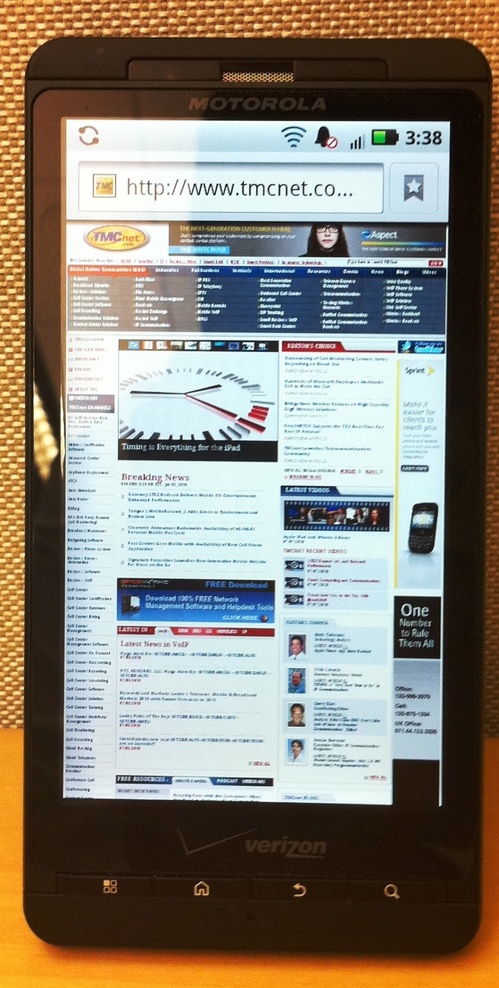
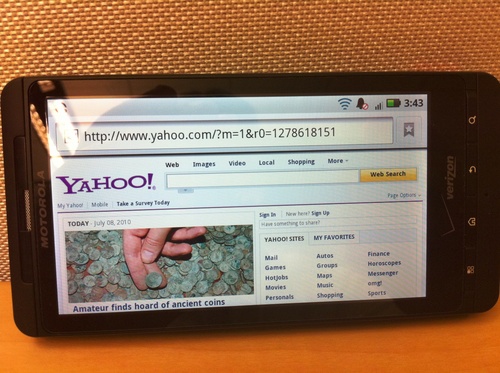
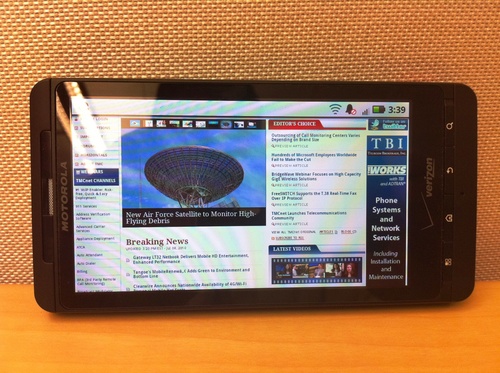
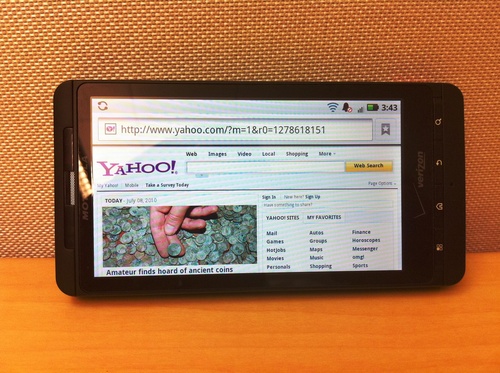
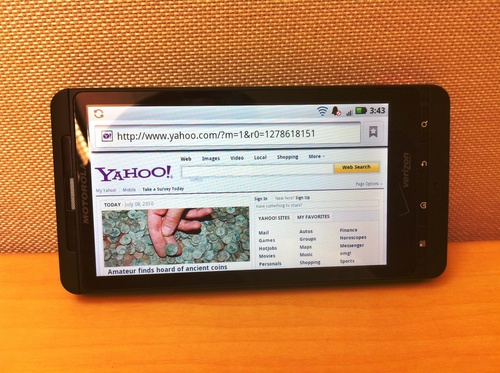

Martin Suter
July 8, 2010 at 5:10 pmRich;
Nice to see Motorola come out of its tailspin with a focus on Android. Who would have thought 12 months ago that MOT would have the hottest (or 2nd hottest if you’re an Apple fan)?
It’s clear that Apple, like Microsoft and Google, has its own business model. Each has its advantages and disadvantages. Look at Microsoft – massive distribution across OEMs, but the engineering, QA and support efforts required for the universe of 3rd-party components, drivers, etc. is huge and arguably why it takes so long to rev Windows.
Being totally integrated, a la Apple, has its obvious benefits from an engineering perspective, but take a look at it from a business perspective as well. Apple generates (and gets to keep) 100% of the revenue from the sale of every device – every iPhone, iPad, iPod, MacBook, etc. that it sells. It’s “revenue per device” is ~$500 per iPhone, not including revenue from iTunes, App Store, iAd, etc. I’ve read that the estimated COGS on each iPhone is just shy of $200, giving Apple $300 of contribution margin per phone sold. What does Google’s revenue model look like for Android? How much revenue from each device accrues to Google? Its market share will have to eventually end up as a significant multiple of Apple’s in order to approach the revenue and profit generated by a much smaller number of Apple devices.
I’m tempted to look at the Android, if only because it’s a shiny, new toy, but for me, iTunes is what makes the iPhone so sticky. My music library, photos and apps are all organised for me (and paid for) and I’m not going to change media players on my laptop. So the choice seems to be going back to carrying an iPod with a Droid, which is not that interesting.
That’s my .02!
Martin Suter
texmex
July 8, 2010 at 6:41 pmCurrently, the price of the Android phones are about the same as the iPhone so I don’t see too much advantage. Here is something that one should consider. I get the feeling that the Android market is moving too fast. In the fall, the Droids were released, In January, Google announce the Nexus, which had high praises, but service problems. A couple of months later, the Incredible was the hot model, hard to get and I think it still may be. Soon, the Evo was release. I understand it has a waiting list as well, and now the Droid X is being release in a few weeks. I can only imagine that people that want the newest technology may sometimes keep looking at the horizon waiting for the next new phone to be release, never getting the phone that they thought they wanted because they fear of being behind the curve in just a few weeks. The quick release of new phone models does not allow for one particular model to become a huge success. Sure a lot of Android phones will sell, but is any one phone going to rise above the crowd long enough for it to be noticed?
There is an advantage to buying an iPhone and having some sense of satisfaction that it would be outdated in just a few weeks by a newer iPhone model. Likewise, this keeps the resale values higher. Radio Shack offers trade in values. My 2 year old iPhone 3G has a higher resale value of $100 than a 9 month old Moto Droid of $71.83. How low will the Droid trade in value be at the 2 year age? Probably much much lower, so in reality, the cost of ownership for the iPhone is much less.
Dave
July 8, 2010 at 6:55 pmI disagree on several levels.
First, there’s some twisting of historical facts.
(1) Apple went from not licensing their Mac OS to OEMs to licensing it in the 1990s – and nearly went bankrupt. Ever since they stopped licensing out their OS they’ve seen unit sales and market share consistently increase.
(2) Was that last sentence of mine a twisting of facts too? You betcha. Because the real reason unit sales and market share increased was that Steve Jobs came back and simplified their product line.
(3) Why is it that everybody likes to ask this question by including some supposed mistake they made in the 1980s – and then conveniently ignores that other closed product that really pulled them back from the brink of death? I’m speaking of the iPod of course. Several companies – before and after Apple – created open MP3 players. Even Microsoft! Yet none ever really made a dent in Apple’s dominant maret share.
Second, I have a problem with what sounds (to me) like some assumptions you haven’t really thought through.
(1) Let’s continue with the iPod. Over the last decade people have complained about everything from the iTunes bloated software, the iTunes store, lack of streaming, DRM, supposedly proprietary and not open codecs, to even a lack of features. With so many faults, how has it continued to dominate? Three words – “it just works”.
(2) Think about that for a minute. Can you honestly tell me that you can say that about a computer? No – not even a 21st century Mac. But you know what? A 21st century Mac is about as close as you are going to get. Computers require some technical knowledge. But of course, if you want to make sure it’s not bloated and just works the FIRST thing you do i make sure it’s backwards compatible like Vista was. (Sarcasm intended.)
(3) Now let’s move to smart phones. And let’s try to drift away from the echo chamber that most of us technical savvy people who post – and comment – online usually live in. Let me ask you… how many versions of Android are there? And is the app store offerings the same in all of them? My Droid I bought last November – can I upgrade it to Android 2.2? Their flavor of multi-tasking – do I need to track what apps I have running for battery life?
Android looks super. And 2.2 looks like a nice incremental improvement and should hold out for a few months until 3.0 comes out. So does Droid X look to be a sweet piece of hardware. ANd the best part – for some anyways – is no AT&T.
But all of that doesn’t add up to (a) things “just working” to a point that my mother would buy one or (b) Apple making anything close to a 1980s mistake.
Dave
AdamC
July 8, 2010 at 8:09 pmWhat a crude looking phone, which only a mother can love, hi mum.
Jbelkin
July 8, 2010 at 8:32 pmI think u hit it upon the head – android is much like win os – spotty security, weak os but flashy specs and as the market is now – win pc is the bargain hunter buyers or low bid market while mabcs are full margin items … Already happening with the iPhone – as u note, android ‘seems’ like a fine os when u play with it for 5 minutes but of course, like any copy of the original, as long as u don’t look too closely … It’s a fine free os that does a fine job of mimicking the iPhone os but as real users find out, making a bigger screen but spreading out the same pixels makes for a poor display compared to the iPhone (217 pixels to iPhones 326 per inch is a laughable gulf ) … So ur right about the comparison, androids best days are already behind it like win os ( now that google can’t crib notes at apples board meeting – they have turned to verizon, moto and adobe) so while Mac os & ios charges ahead at full speed and at full margins, android is like the 1980s os – weak integration, spotty security, poor battery life but it is good enough for bargain hunters.
Henry Bowman
August 1, 2010 at 10:22 pm“Is Apple repeating its mistake of not licensing its software to a variety of hardware manufacturers?”
What Dave said — they DID license it, and it damn near killed them. They only recovered when they reversed the licensing policy, stopped trying to deal in stupid MBA-land, and started dealing again in technology and innovation, where they excel.
Related Articles
GTT Communications: Pioneering the Future of Managed Network and Security Services
NTIA Announces Key Details for $42.5B BEAD Program: Emphasizing Digital Equity
Why Teaching STEM to Inner-City Kids is Like Fracking For Untapped Potential